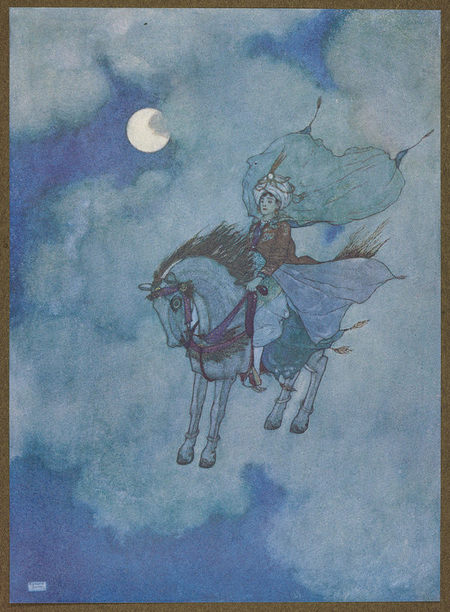
A story from Arabian Nights
In the land of the Persians there lived in ancient times a King who had three daughters and an only son of such beauty that they drew the eyes of all beholders like moonrise in a clear heaven. Now it was the custom in that country for a great festival to be held at the new year, during which people of all grades, from the highest to the lowest, presented themselves before the King with offerings and salutations. So it happened that on one of these days there came to the King as he sat in state three sages, masters of their craft, bringing gifts for approval. The first had with him a peacock of gold which was so constructed that at the passing of each hour it beat its wings and uttered a cry. And the King, having proved it, found the gift acceptable and caused the inventor thereof to be suitably rewarded. The second had made a trumpet so that [ ]if placed over the gates of a city it blew a blast against any that sought to enter; and thus was the city held safe from surprise by an enemy. And when the King had found that it possessed that property, he accepted it, bestowing on its maker a rich reward.
But the gift of the third sage, who was an Indian, appeared more prodigious than all, for he had brought with him a horse of ivory and ebony, for which he claimed that, at the will of its owner, or of any one instructed in the secret, it would rise above the earth and fly, arriving at distant places in a marvellously short space of time. The King, full of wonder at such a statement, and eager to test it, was in some doubt as to how he might do so, for the Indian was unwilling to part with the secret until secure of the reward which in his own mind he had fixed on. Now it happened that at a distance of some three leagues from the city there stood a mountain the top of which was clearly discernible to all eyes; so, in order that the Indian’s word might be proved, the King, pointing to it, said, “Go yonder, and bring back to me while I wait the branch of a palm-tree which grows at the foot [ ]of that mountain; then I shall know that what you tell me is true.”
Instantly the Indian set foot in the stirrup and vaulted upon his charger, and scarcely had he turned a small peg which was set in the pommel of the saddle, when the horse rose lightly into the air and bore him away at wondrous speed amid the shouts of the beholders; and while all were still gazing, amazed at so sudden a vanishing, he reappeared high overhead, bearing the palm branch, and descending into their midst alighted upon the very spot from which he had started, where, prostrating himself, he laid the branch at the King’s feet.
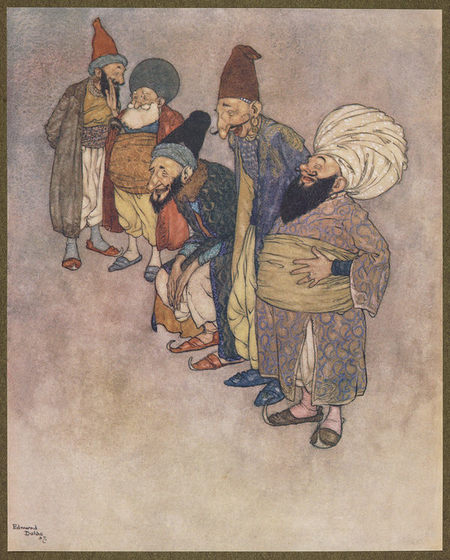
At so arrogant a claim all the courtiers burst into loud laughter.
The King was so delighted when the wonderful properties of the horse had been thus revealed to him, that, eager to possess it, he bade the Indian name his own reward, declaring that no price could be too great. Then said the sage, “Since your Majesty so truly appreciates the value of my invention, I do not fear that the reward I ask for will seem too high. Give me in marriage the hand of the fairest of your three daughters, and the horse shall be yours.”
At so arrogant a claim all the courtiers burst [ ]into loud laughter; the King alone, consumed with the desire of possessing the wonderful treasure, hesitated as to what answer he should give. Then the King’s son, Prince Firouz Schah, seeing his father lend ear to so shameful a proposal, became moved with indignation. Determined to defend his sister’s honour and his own, he addressed the King. “Pardon me, Sire,” said he, “if I take the liberty of speaking. But how shall it be possible for one of the greatest and most powerful monarchs to ally himself to a mere nobody? I entreat you to consider what is due not to yourself alone but to the high blood of your ancestors and of your children.”
“My son,” replied the King of Persia, “what you say is very true, so far as it goes; but you do not sufficiently consider the value of so incomparable a marvel as this horse has proved itself to be, or how great would be my chagrin if any other monarch came to possess it. And though I have not yet agreed to the Indian’s proposal, I cannot incontinently reject it. But first I must be satisfied that the horse will obey other hands besides those of its inventor, [ ]else, though I become its possessor, I may find it useless.”
The Indian, who had stood aside during this discussion, was now full of hope, for he perceived that the King had not altogether rejected his terms, and nothing seemed likelier than that the more he became familiar with the properties of the magic horse the more would he wish to possess it. When, therefore, the King proposed that the horse should be put to a more independent trial under another rider, the Indian readily agreed; the more so when the prince himself, relinquishing his apparent opposition, came forward and volunteered for the essay.
The King having consented, the prince mounted, and eager in his design to give his father opportunity for cooler reflection, he did not wait to hear all the Indian’s instructions, but turning the peg, as he had seen the other do when first mounting, caused the horse to rise suddenly in the air, and was carried away out of sight in an easterly direction more swiftly than an arrow shot from a bow.
No sooner had the horse and its rider disappeared than the King became greatly concerned for [ ]his son’s safety; and though the sage could justly excuse himself on the ground that the young prince’s impatience had caused him to cut short the instructions which would have insured his safe return, the King choose to vent upon the Indian the full weight of his displeasure; and cursing the day wherein he had first set eyes on the magic horse, he caused its maker to be thrown into prison, declaring that if the prince did not return within a stated time the life of the other should be forfeit.
The Indian had now good cause to repent of the ambition which had brought him to this extremity, for the prince, of whose opposition to his project he had been thoroughly informed, had only to prolong his absence to involve him in irretrievable ruin. But on the failure of arrogant pretensions the sympathy of the judicious is wasted; let us return therefore to Prince Firouz Schah, whom we left flying through the air with incredible swiftness on the back of the magic steed.
For a time, confident of his skill as a rider and undismayed either by the speed or altitude of his flight, the prince had no wish to [ ]return to the palace; but presently the thought of his father’s anxiety occurred to him, and being of a tender and considerate disposition he immediately endeavoured to divert his steed from its forward course. This he sought to do by turning in the contrary direction the peg which he had handled when mounting, but to his astonishment the horse responded by rising still higher in the air and flying forward with redoubled swiftness. Had courage then deserted him, his situation might have become perilous; but preserving his accustomed coolness he began carefully to search for the means by which the speed of the machine might be abated, and before long he perceived under the horse’s mane a smaller peg, which he had no sooner touched than he felt himself descending rapidly toward the earth, with a speed that lessened the nearer he came to ground.

As he descended, the daylight in which hitherto he had been traveling faded from view.
As he descended, the daylight in which hitherto he had been traveling faded from view, and he passed within a few minutes from sunset into an obscurity so dense that he could no longer distinguish the nature of his environment, till, as the horse alighted, he perceived beneath him a smooth expanse ending abruptly on all [ ]sides at an apparent elevation among the objects surrounding it.
Dismounting he found himself on the roof of a large palace, with marble balustrades dividing it in terraces, and at one side a staircase which led down to the interior. With a spirit ever ready for adventure Prince Firouz Schah immediately descended, groping his way through the darkness till he came to a landing on the further side of which an open door led into a room where a dim light was burning.
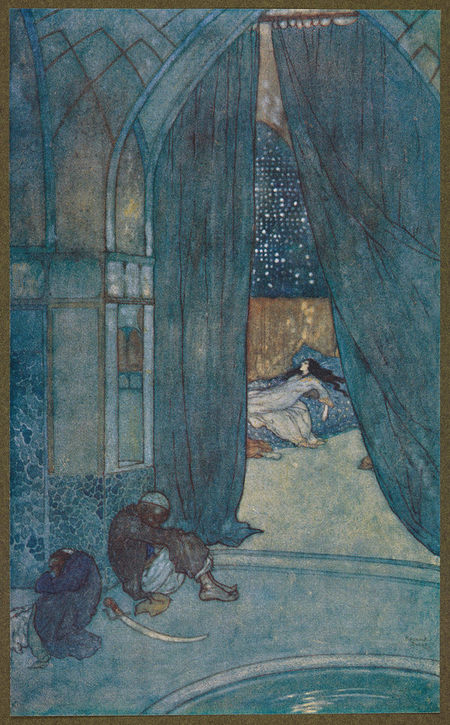
The prince paused at the doorway to listen, but all he could hear was the sound of men breathing heavily in their sleep. He pushed the door and entered; and there across an inner threshold he saw black eunuchs lying asleep, each with a drawn sword in his hand. Immediately he guessed that something far more fair must lie beyond; so, undeterred by the danger, he advanced, and stepping lightly across their swords passed through silken hangings into the inner chamber. Here he perceived, amid surroundings of regal magnificence, a number of couches, one of which stood higher than the rest. Upon each of these a fair damsel lay asleep; but upon that which was raised above its fellows lay a form of such perfect and enchanting beauty that the prince had no will or power to turn away after once beholding it. Approaching the sleeper softly, he kneeled down and plucked her gently by the sleeve; and immediately the princess—for such if rank and beauty accorded she needs must be—opened to him the depths of her lustrous eyes and gazed in quiet amazement at the princely youth whose handsome looks and reverent demeanour banished at once all thought of alarm.
Now it so happened that a son of the King of India was at that time seeking the hand of the princess in marriage; but her father, the King of Bengal, had rejected him owing to his ferocious and disagreeable aspect. When therefore the princess saw one of royal appearance kneeling before her she supposed he could be no other than the suitor whom she knew only by report, and shedding upon him the light of her regard, “By Allah,” she said, smiling, “my father lied in saying that good looks were lacking to thee!”
Prince Firouz Schah, perceiving from these [ ]words and the glance which accompanied them, that her disposition towards him was favourable, no longer feared to acquaint her with the plight in which he found himself; while the princess, for her part, listened to the story of his adventures with lively interest, and learned, not without secret satisfaction, that her visitor possessed a rank and dignity equal to her own.
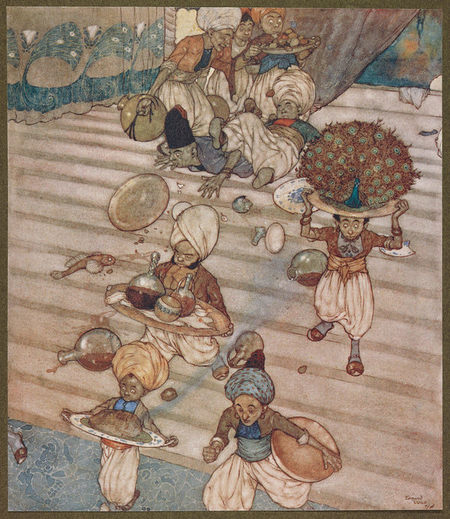
Meanwhile the maidens who were in attendance on the princess had awakened in dismay to the unaccountable apparition of a fair youth kneeling at the feet of their mistress, and, dreading discovery by the attendants, were all at a loss what to do. The princess however, seeing that they were awake, called them to her with perfect composure and bade them go instantly and prepare an inner chamber where the prince might sleep and recover from the fatigues of his journey; at the same time she gave orders for a rich banquet to be prepared against the time when he should be ready to partake of it. Then when her visitor had retired, she arose and began to adorn herself in jewels and rich robes and to anoint her body with fragrance, giving her women no rest till the tale of her mirror [ ]contented her; and when all had been done many times over, and the last touch of art added to her loveliness, she sent to inquire whether the prince had yet awaked and were ready to receive her.
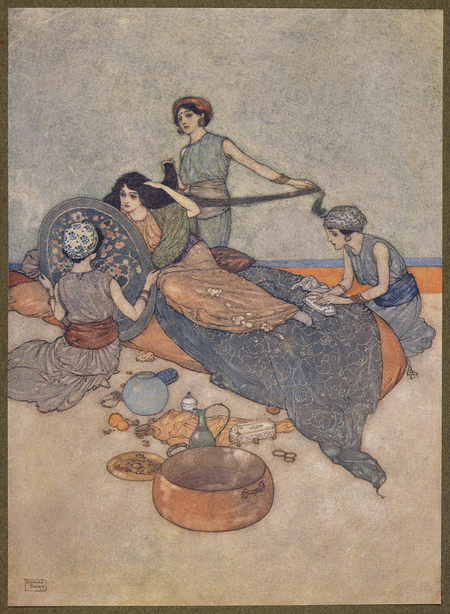
Upon the receipt of that message the prince rose eagerly, and dressing in haste, although it was scarcely yet day, heard everywhere within the palace sounds of preparation for the feast that was being got ready in his honour.
Before long the princess herself entered to inquire how he had slept, and being fully assured on that score, she gave orders for the banquet to be served. Everything was done in the greatest magnificence, but the princess was full of apologies, declaring the entertainment unworthy of so distinguished a guest. “You must pardon me, prince,” she said, “for receiving you with so little state, and after so hasty a preparation; but the chief of the eunuchs does not enter here without my express permission, and I feared that elsewhere our conversation might be interrupted.”
Prince Firouz Schah was now convinced that the inclinations of the princess corresponded [ ]with his own; but though her every word and movement increased the tenderness of his passion, he did not forget the respect due to her rank and virtue. One of her women attendants however, seeing clearly in what direction matters were tending, and fearing for herself the results of a sudden discovery, withdrew secretly, saying nothing to the rest, and running quickly to the chief of the eunuchs she cried, “O miserable man, what sorry watch is this that thou hast kept, guarding the King’s honour; and who is this man or genie that thou hast admitted to the presence of our mistress? Nay, if the matter be not already past remedy the fault is not thine!” At these words the eunuch leapt up in alarm, and going secretly he lifted the curtain of the inner chamber, and there beheld at the princess’s side a youth of such fair and majestical appearance that he durst not intrude unbidden. He ran shrieking to the King, and as he went he rent his garments and threw dust upon his head. “O sire and master,” he cried, “come quickly and save thy daughter, for there is with her a genie in mortal form and like a king’s son to look upon, and if he have not already carried [ ]her away, make haste and give orders that he be seized, lest thou become childless.”
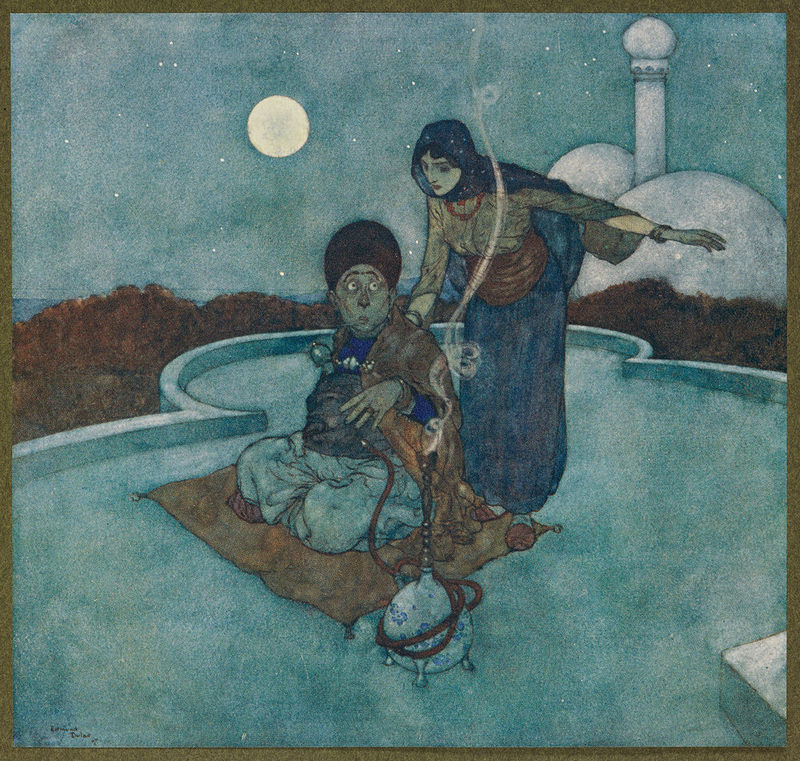
The King at once arose and went in great haste and fear to his daughters palace. There he was met by certain of her women, who, seeing his alarm, said, “O sire, have no fear for the safety of thy daughter; for this young man is as handsome of heart as of person, and as his conduct is chaste, so also are his intentions honourable.”
Then the King’s wrath was cooled somewhat; but since much remained which demanded explanation he drew his sword and advanced with a threatening aspect into the room where his daughter and the prince still sat conversing. Prince Firouz Schah observing the new-comer advance upon him in a warlike attitude, drew his own sword and stood ready for defence; whereupon the King, seeing that the other was the stronger, sheathed his weapon, and with a gesture of salutation addressed him courteously. “Tell me, fair youth,” he said, “whether you are man or devil, for though in appearance you are human, how else than by devilry have you come here?”
[ ]“Sire,” replied the youth, “but for the respect that is owing to the father of so fair a daughter, I, whom am a son of kings, might resent such an imputation. Be assured, however, that by whatever means I have chosen to arrive, my intentions now are altogether human and honourable; for I have no other or dearer wish than to become your son-in-law through my marriage with this princess in whose eyes it is my happiness to have found favour.”
“What you tell me,” answered the King, “may be all very true; but it is not the custom for the sons of kings to enter into palaces without the permission of their owners, coming, moreover, unannounced and with no retinue or mark of royalty about them. How, then, shall I convince my people that you are a fit suitor for the hand of my daughter?”
“The proof of honour and kingship,” answered the other, “does not rest in splendour and retinue alone, though these also would be at my call had I the patience to await their arrival from that too distant country where my father is king. Let it suffice if I shall be able to prove my worth alone and unaided, in such a manner as to [ ]satisfy all.” “Alone and unaided?” said the King; “how may that be?” “I will prove it thus,” answered the prince. “Call out your troops and let them surround this palace; tell them that you have here a stranger, of whom nothing is known, who declares that if you will not yield him the hand of your daughter in marriage he will carry her away from you by force. Bid them use all means to capture and slay me, and if I survive so unequal a contest, judge then whether or no I am fit to become your son-in-law.”
The King immediately accepted the proposal, agreeing to abide by the result; yet was he grieved that a youth of such fair looks and promise should throw away his life in so foolhardy an adventure. As soon as day dawned he sent for his Vizier and bade him cause all the chiefs of his army to assemble with their troops and companies, till presently there were gathered about the palace forty thousand horsemen and the same number of foot; and the King gave them instructions, saying, “When the young man of whom I have warned you comes forth and challenges you to battle, then fall upon and [ ]slay him, for in no wise must he escape.” He then led the prince to an open space whence he could see the whole army drawn up in array against him. “Yonder,” said the King, pointing, “are those with whom you have to contend; go forth and deal with them as seems best to you.”
“Nay,” answered the prince, “these are not fair conditions, for yonder I see horsemen as well as foot; how shall I contend against these unless I be mounted?” The King at once offered him the best horse in his stables, but the prince would not hear of it. “Is it fair,” he said, “that I should trust my life under such conditions to a horse that I have never ridden? I will ride no horse but that upon which I came hither.” “Where is that?” inquired the King. “If it be where I left it,” answered the prince, “it is upon the roof of the palace.”
All who heard this answer were filled with laughter and astonishment, for it seemed impossible that a horse could have climbed to so high a roof. Nevertheless the King commanded that search should be made, and there, sure enough, those that were sent found the horse of ebony and ivory standing stiff and motionless. So [ ]though it still seemed to them but a thing for jest and mockery, obeying the King’s orders they raised it upon their shoulders, and bearing it to earth carried it forth into the open space before the palace where the King’s troops were assembled.
Then Prince Firouz Schah advanced, and leaping upon the horse he cried defiance to the eighty thousand men that stood in battle array against him. And they, on their part, seeing the youth so hardily set on his own destruction, drew sword and couched spear, and came all together to the charge. The prince waited till they were almost upon him, then turning the peg which stood in the pommel of his saddle he caused the horse to rise suddenly in the air, and all the foremost ranks of the enemy came clashing together beneath him. At that sight the King and all his court drew a breath of astonishment, and the army staggered and swung about this way and that, striking vainly up at the hoofs of the magic horse as it flew over them. Then the King, full of dread lest this should indeed be some evil genie that sought to carry his daughter away from him, called to his [ ]archers to shoot, but before they could make ready their bows Prince Firouz Schah had given another turn to the peg, and immediately the horse sprang upward and rose higher than the roof of the palace, so that all the arrows fell short and rained destruction on those that were below.
Then the prince called to the King, “O King of Bengal, have I not now proved myself worthy to be thy son-in-law, and wilt thou not give me the hand of thy daughter in marriage?” But the King’s wrath was very great, for he had been made foolish in the eyes of his people, and panic had broken the ranks of his army and many of them were slain; and by no means would he have for his son-in-law one that possessed such power to throw down the order and establishment of his kingdom. So he cried back to the prince, saying, “O vile enchanter, get hence as thou valuest thy life, for if ever thou darest to return and set foot within my dominions thy death and not my daughter shall be thy reward!” Thus he spoke in his anger, forgetting altogether the promise he had made.
Now it should be known that all this time the [ ]princess had been watching the combat from the roof of the palace; and as her fear and anxiety for the prince had in the first instance been great, so now was she overjoyed when she saw him rise superior to the dangers which had threatened him. But as soon as she heard her father’s words she became filled with fresh fear lest she and her lover were now to be parted; so as the prince came speeding by upon the magic horse she stretched up her arms to him, crying, “O master of the flying bird, leave me not desolate, for if thou goest from me now I shall die.”
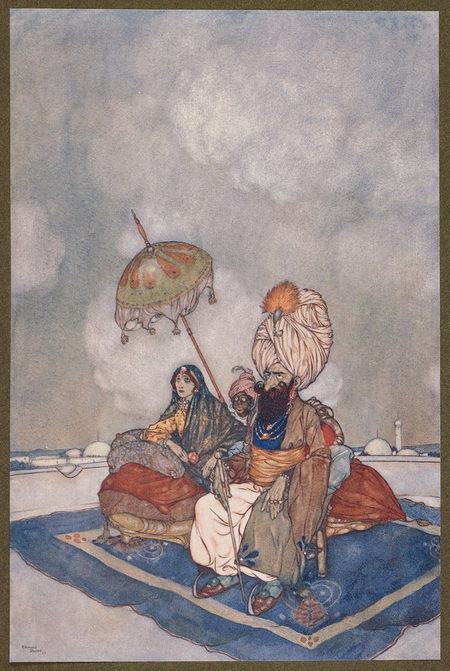
No sooner did Prince Firouz Schah hear those words than he checked his steed in its flight, and swooping low he bore down over the palace roof, and catching the princess up in his arms placed her upon the saddle before him; and straightway at the pressure of its rider the horse rose under them and carried them away high in air, so that they disappeared forthwith from the eyes of the King and his people.
But as they travelled the day grew hot and the sun burned fiercely upon them; and the prince looking down beheld a green meadow by the side of a lake; so he said, “O desire of my heart, let [ ]us go down into yonder meadow and seek rest and refreshment, and there let us wait till it is evening, so that we may come unperceived to my fathers palace; and when I have brought thee thither safely and secretly, then will I make preparation so that thou mayest appear at my fathers court in such a manner as befits thy rank.”
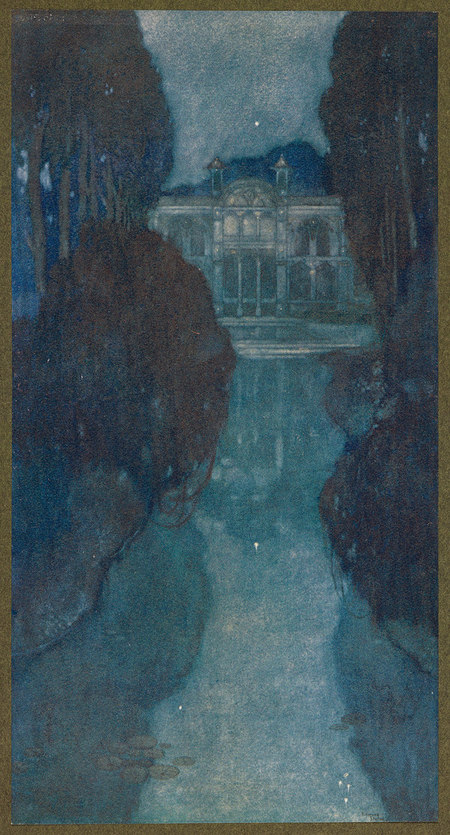
So the princess consenting, they went down and sat by the lake and solaced themselves sweetly with love till it was evening. Then they rose up and mounted once more upon the magic horse and came by night to the outskirts of the city where dwelt the King of Persia. Now in the garden of the summer palace which stood without the walls all was silence and solitude, and coming thither unperceived the King’s son led the princess to a pavilion, the door of which lay open, and placing before it the magic horse he bade her stay within and keep watch till his messenger should come to take her to the palace which he would cause to be prepared for her.
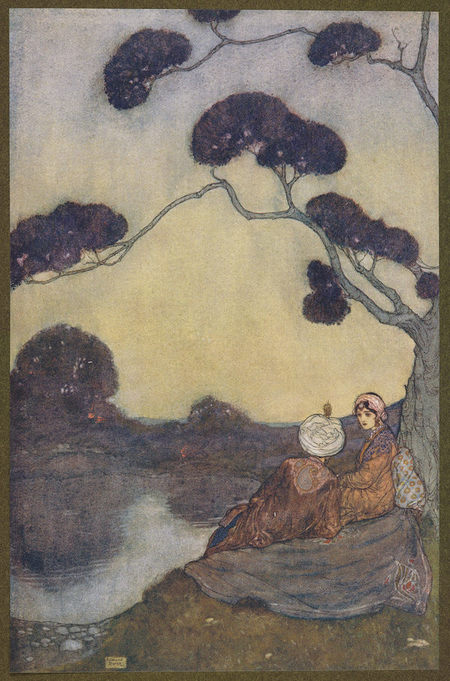
Leaving her thus safely sheltered, the prince went in to the city to present himself before the King his father; and there he found him in deep [ ]mourning and affliction because of his son’s absence; and his father seeing him, rose up and embraced him tenderly, rejoicing because of his safe return, and eager to know in what way he had fared. And the prince said, “O my father, if it be thy good will and pleasure, I have come back to thee far richer than I went. For I have brought with me the fairest princess that the eyes of love have ever looked upon, and she is the daughter of the King of Bengal; and because of my love for her and the great service which she rendered me when I was a stranger in the midst of enemies, therefore have I no heart or mind or will but to win your consent that I may marry her.” And when the King heard that, and of all that the princess had done, and of how they had escaped together, he gave his consent willingly, and ordered that a palace should be immediately got ready for her reception that she might on the next day appear before the people in a manner befitting her rank.
Then while preparation was going forward, the prince sought news concerning the sage, for he feared that the King might have slain him. “Do not speak of him,” cried the King. “Would [ ]to Heaven that I had never set eyes on him or his invention, for out of this has arisen all my grief and lamentation. Therefore he now lies in prison awaiting death.”
“Nay,” said the prince “now surely should he be released and suitably rewarded, seeing that unwittingly he hath been the cause of my fortune; but do not give him my sister in marriage.”
So the King sent and caused the Indian to be brought before him clad in a robe of rank. And the King said to him, “Because my son, whom thy vile invention carried away from me, hath returned safe and sound, therefore will I spare thy life. And for the reward of thine ingenuity I give thee this robe of honour; but now take thy horse, wherever it may be, and go, nor ever appear in my sight again. And if thou wilt marry, seek one of thine own rank, but do not aspire to the daughters of kings.”
When the Indian heard that, he dissembled his rage, and bowing himself to the earth departed from the King’s presence. And, as he went, everywhere in the palace ran the tale how the King’s son had returned upon the magic horse, [ ]bringing with him a princess of most marvellous beauty, and how they had alighted in the gardens of the summer palace that lay outside the walls.
Now when this was told him the Indian at once saw his opportunity, and going forth from the city in haste he arrived at the summer palace before the messenger with the appointed retinue which the prince and the King were sending. So coming to the pavilion in the garden he found the princess waiting within, and before the door the horse of ivory and ebony. Then was his heart uplifted for joy, the more so when he perceived how far the damsel exceeded in loveliness all that had been told of her. Entering the chamber where she sat he kissed the ground at her feet; and she, seeing one that wore a robe of office making obeisance before her, speak to him without fear, saying, “Who art thou?”
The sage answered, “O moon of beauty, I am but the dust which lies upon the road by which thou art to travel. Yet I come as a messenger from the King’s son who hath sent me to bring thee with all speed to a chamber in the royal palace where he now awaits thee.”
Now the Indian was of a form altogether [ ]hideous and abominable. The princess looked at him, therefore, in surprise, saying, “Could not the King’s son find any one to send to me but thee?” The sage laughed, for he read the meaning of her words. “O searcher of hearts,” he said, “do not wonder that the prince hath sent to thee a man whose looks are unattractive, for because of his love toward thee he is grown exceeding jealous. Were it otherwise, I doubt not that he would have chosen the highest and most honourable in the land; but, being what I am, he has preferred to make me his messenger.”
When the princess heard that, she believed him, and because her impatience to be with her lover was great, she yielded herself willingly into his hands. Then the sage mounted upon the horse and took up the damsel behind him; and having bound her to his girdle for safety, he turned the pin so swiftly that immediately they rose up into the air far above the roof of the palace and in full view of the royal retinue which was even then approaching.
Now because his desire to be with his beloved was so strong, the prince himself had come forth [ ]before all others to meet her; and when he saw her thus carried away captive, he uttered a loud cry of lamentation, and stretched out his hands toward her. The cry of her lover reached the ears of the princess, and looking down she saw with wonder his gestures of grief and despair. So she said to the Indian, “O slave, why art thou bearing me away from thy lord, disobeying his command?” The sage answered, “He is not my lord, nor do I owe him any duty or obedience. May Heaven repay on him all the grief he has brought on me, for I was the maker of this horse on which he won thee, and because he stole it from me I was cast into prison. But now for all my wrongs I will take full payment, and will torture his heart as he hath tortured mine. Be of good cheer, therefore, for doubt not that presently I shall seem a more desirable lover in thine eyes than ever he was.”
On hearing these words the princess was so filled with terror and loathing that she endeavoured to cast herself from the saddle; but the Indian having bound her to his girdle, no present escape from him was possible.
The horse had meanwhile carried them far [ ]from the city of the King of Persia, and it was yet an early hour after dawn when they arrived over the land of Cashmire. Assured that he was now safe from pursuit, and perceiving an uninhabited country below him, the Indian caused the horse to descend on the edge of a wood bordered by a stream. Here he made the princess dismount, and was proceeding to force upon her his base and familiar attentions, when the cries raised by the princess drew to that spot a party of horsemen who had been hunting in the neighbourhood. The leader of the party, who chanced to be no other than the Sultan of that country, seeing a fair damsel undergoing ill-treatment from one of brutish and malevolent aspect, rode forward and demanded of the Indian by what right he so used her. The sage boldly declared that she was his wife and that how he used her was no man’s business but his own. The damsel, however, contradicted his assertion with indignation and scorn, and so great were her beauty and the dignity of her bearing that her statement of the case had only to be heard to be believed. The Sultan therefore ordered the Indian to be bound and beaten, and afterwards [ ]to be led away to the adjacent city and there cast into the deepest dungeon. As for the princess and magic horse, he caused them to be brought to the palace; and there for the damsel he provided a magnificent apartment with slaves and attendants such as befitted her rank; but the horse, whose properties remained secret, since no other use for it could be discovered, was placed in the royal treasury.
Now though the princess was full of joy over her escape from the Indian, and of gratitude to her deliverer, she could not fail to read in the Sultan’s manner towards her the spell cast by her beauty. And, in fact, no later than the next day, awakened by sounds throughout the whole city of tumult and rejoicing, and inquiring as to the reason, she was informed that these festivities were the prelude to her own nuptials with the Sultan which were to be celebrated that very day before sundown.
At this news her consternation was so great that she immediately swooned away, and remained for a long while speechless. But no sooner had she recovered possession of her faculties than her resolution was formed, and [ ]when the Sultan entered, as is customary on such occasions, to present his compliments and make inquiries as to her health, she fell into an extravagance of attitude and speech, so artfully contrived that all who beheld her became convinced of her insanity. And the more surely to effect her purpose, and at the same time to relieve her feelings, she made a violent attack upon the Sultan’s person; nor did she desist until she had brought him to recognize that all hopes for the present consummation of the nuptials were useless.
On the following day also, and upon every succeeding one, the princess showed the same violent symptoms whenever the Sultan approached her. It was in vain that all the wisest physicians in the country were summoned into consultation. While some declared that her malady was curable, others, to whose word the princess by her actions lent every possible weight, declared that it was incurable; and in no case was any remedy applied that did not seem immediately to aggravate the disorder.

It was in vain that all the wisest physicians in the country were summoned into consultation.
And here for a while we must leave the princess and return to Prince Firouz Schah, whose [ ]affliction no words can describe. Unable to endure the burden of his beloved one’s absence in the splendours of his father’s palace, or to leave her the victim of fate without an attempt at rescue, he put on the disguise of a travelling dervish, and departing secretly from the Persian court set out into the world to seek for her.
For many months he travelled without clue or tidings to guide him; but as Heaven ever bestows favour on constancy in love, so it led him at last to the land of Cashmire, and to the city of its Sultan. Now as he drew near to it by the main road, he fell into conversation with a certain merchant, and inquired of him as to the city and the life and conditions of its inhabitants. And the merchant looked at him in surprise, saying, “Surely you have come from a far country not to have heard of the strange things which have happened here, for everywhere in these regions and among all the caravans goes the story of the strange maiden, and the ebony horse, and the waiting nuptials.”

Now when the prince heard that, he knew that the end of his wanderings was in sight: so looking upon the city with eyes of gladness, [ ]“Tell me,” he said, “for I know none of these things.” So the merchant told him truly all that has here been narrated; and having ended he said, “O dervish, though you are young, you have in your eyes the light of wisdom; and if you have also in your hands the power of healing, then I tell you that in this city fortune awaits you, for the Sultan will give even the half of his kingdom to any man that shall restore health of mind to this damsel.”
Then the King’s son felt his heart uplifted within him, howbeit he knew well that the fortune he sought would not be of the Sultan’s choosing; so parting from the merchant, he put on the robe of a physician, and went and presented himself at the palace.
The Sultan was glad at his coming, for though many physicians had promised healing and had all failed, still each new arrival gave him fresh hopes. Now as the sight of a physician seemed ever greatly to increase the princess’s malady, the Sultan led him to a small closet or balcony, that thence he might look upon her unperceived. So Prince Firouz Schah, having travelled so many miles in search of her, saw [ ]his beloved seated in deep despondency by the side of a fountain; and ever with the tears falling down from her eyes she sighed and sang. Now when he heard her voice and the words, and beheld the soft grief of her countenance, then the prince knew that her disorder was only feigned; and he went forth and said to the Sultan, “This malady is curable; but for the cure something is yet lacking. Let me go in and speak with the damsel alone, and on my life I promise that if all be done according to my requirements, before this time to-morrow the cure shall be accomplished.”
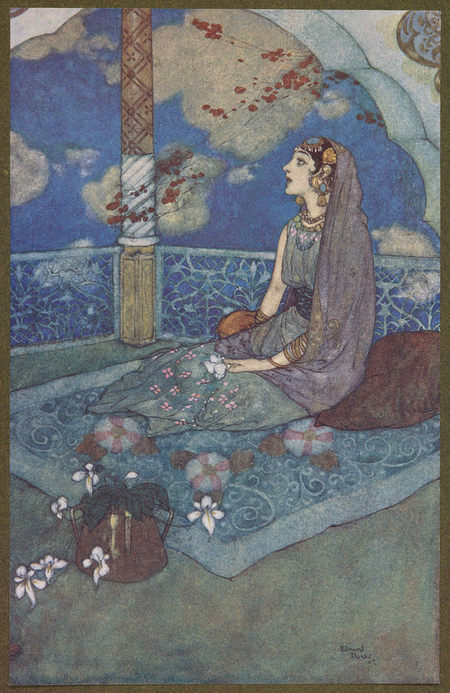
At these words the Sultan rejoiced greatly, and he ordered the doors of the princess’s chamber to be opened to the physician. So Firouz Schah passed in, and he and his beloved were alone together. Now because of his grief and wanderings and the growth of his beard, the face of the prince was so changed that the princess did not know him; but seeing one before her in the dress of a physician she rose up in pretended frenzy and began to throw herself about with violence, until from utter exhaustion she fell prostrate. Thereupon the prince drew near, and called her [ ]gently by name; and immediately when she heard his voice she knew him, and uttered a loud cry. Then the king’s son put his mouth to her ear and said “O temptation of all hearts, now spare my life and have patience, for surely I am come to save thee; but if the Sultan learn who I am we are dead, thou and I, because his jealousy is great.” So she replied, saying, “O thou that bringest me life, tell me what I shall do?” The prince said, “When I depart hence let it appear that I have restored to thee the possession of thy faculties; howbeit the full cure is to come after. Therefore when the Sultan comes to thee, be sad and meek and do not repulse him as thou hast done aforetime. Yet have no fear but that I will keep thee safe from him to the last.” And so saying he left the princess and returned to the Sultan, and said to him, “Go in and see whether the cure be not already at work; but approach not near to her, for though the genie that possessed her is bound he is not yet cast forth: nevertheless to-morrow before noon the remedy shall be complete.”
So the Sultan went and found her even as he had been told; and with joy and gratitude he [ ]returned to Firouz Schah, saying, “Truly thou art a healer and the rest are but bunglers and fools. Now, therefore, give orders and all shall be done according to thy will. Doubt not that thy reward shall be great.”
Then the prince said, “Let the horse of ivory and ebony which was with her at the first be brought forth and set again in the place where it was found, and let the damsel also be brought and put into my hand; and it shall be that when I have set her upon the horse, then the evil genie that held her shall be suddenly loosed, passing from her into that which was aforetime his place of bondage. So shall the remedy be complete, and the princess find joy in her lord before the eyes of all.”
Now when the Sultan heard that, the mystery of the ebony horse seemed plain to him, and its use manifest. Therefore he gave orders that with all speed the thing should be done as the physician of the princess required it.
So early on the morrow they brought the horse from the royal treasury, and the princess from her chamber, and carried them to the place where they were first found; and all about, a great [ ]crowd of the populace was gathered to behold the sight. Then Prince Firouz Schah took the princess and set her upon the horse, and leaping into the saddle before her he turned the pin of ascent, and immediately the horse rose with a great sound into the air, and hung above the heads of the affrighted populace. And the King’s son leaned down from the saddle and cried in a loud voice, “O Sultan of Cashmire, when you wish to espouse princesses which seek your protection, learn first to obtain their consent.” And so saying he put the horse to its topmost speed, and like an arrow on the wind he and the princess were borne away, and passed and vanished, and were no more seen in that land.
But in the city of the King of Persia great joy and welcome and thanksgiving awaited them; and there without delay the nuptials were solemnized and through all the country the people rejoiced and feasted for a full month. But because of the grief and affliction that it had caused him the King broke the ebony horse and destroyed its motions. As for the maker thereof, the Sultan of Cashmire caused him to be put to a cruel death: and thus is the story of the sage and his invention brought to a full ending.

